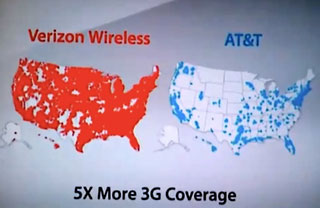Steve Jobs believes in the Wayne Gretzky dictum about skating to
where the puck will be, not where it's been.
Verizon would have made a great launch partner for the iPhone, but
it passed, and Verizon has been left behind. Every quarter the iPhone
adds to the AT&T customer base, and every quarter someone talks up
the end of the AT&T exclusive in the US.
Undoubtedly this benefits Verizon, as it reduces
defections to AT&T. Why move if the iPhone is coming anyway?
Limited Growth Potential
The latest so-called
cost benefit analysis by Christopher Larsen of Piper Jaffray
suggests that Apple could gain 4.6 million sales by allowing Verizon
and Sprint to sell iPhones, and it would only cost $50 of AT&T
subsidy and around $25 in extra development costs per cellphone. After
all, the iPhone market share in France rose from 15% to 40% in the 6
months after the end of exclusivity, so it should happen in the US
too.
This ignores the fact that all the networks in France are GSM. As soon as the courts ruled
against the long term agreement with Orange, all Apple had to do was
sort out contracts with SFR and Bouygues, and then let them get on with
the marketing war.
If the AT&T exclusive ended tomorrow, the only beneficiary would
be T-Mobile, the only major carrier besides AT&T that uses GSM.
Even if T-Mobile sells 1 million extra iPhones a year, that is as many
iPhones as G1s sold. Based on the above figures, Apple would lose
out.
The average carrier price for an iPhone last quarter was slightly
over $600 (Apple analyst conference call). With a 60% margin, the extra
gross profit through T-Mobile would be $360 million, but, according to
the Piper Jaffray figures, Apple would lose $50 per handset from
AT&T. In just the last quarter AT&T activated 3.2 million
iPhones, which would have cost Apple $160 million of the "extra"
profit.
The Problem: CDMA

3G coverage? Verizon has a map for that!
So the whole reason for ending the AT&T exclusive has to be
moving on to the Verizon and Sprint CDMA networks, and these are
networks that both carriers are busy transitioning away from because
they recognise that they are not competitive for the future.
Verizon, to its credit, seems to recognize that it is now second
choice for smartphone manufacturers. It will start rolling out its
LTE
network in major markets next year and has accelerated this program so
it can offer much more and faster data downloads. However, it will be
at least a couple of years before enough is in place to offer a home
for future iPhones - and even then voice will still use the CDMA
network, which will complicate background processing of apps until VoIP
becomes the standard for calls.
Sprint is going the WiMAX route through ClearWire
while trying to hold on to as much of its customer base as possible and
come back from its streak of quarterly losses.
The iPhone Is a World Phone
Apart from the network issues, for the iPhone to be really
successful on Verizon and Sprint and sell the 4.6 million Piper Jaffray
suggests, Apple will need to duplicate the customer experience of the
current and future GSM models. So the CDMA iPhone will need to be a
world phone - but packed into the same iPhone shell so that all the
third party cases and add-ons fit.
This means that Apple Engineering would need to find a way of adding
CDMA electronics to the current GSM electronics in the already packed
iPhone while not affecting the battery life or the placement of any of
the controls, USB, etc. When all the extra support costs are added in,
making and selling a CDMA/GSM model for at most a few years doesn't
seem that attractive compared to other opportunities, such as a model
for China Mobile's 400 million+ subscribers.
The end of the AT&T exclusive isn't going to happen in the
States unless Congress mandates limited agreements to the benefit of
T-Mobile, or if Apple sees a real advantage in moving on because
AT&T tries to reduce the subsidies.
In effect, the US and iPhone suffer from the CDMA/GSM divide, which
the FCC will try to avoid in the next generation of mobile technology.
Meanwhile, in other countries (like Germany and Spain) Apple will be
eager to move onto other GSM networks and reproduce the French gains as
soon as the exclusive agreements end.
Verizon's Opportunity
Nevertheless, there is one huge opportunity for a Verizon-Apple
agreement: A future iTablet or
ARM based netbook with G3 support would be a great way for Verizon
to sell the benefits of its LTE network. This agreement would give
Apple a good launch partner for a product that it would want to sell
through the European operators to displace Windows netbooks and end
Microsoft's mobile dream. 



